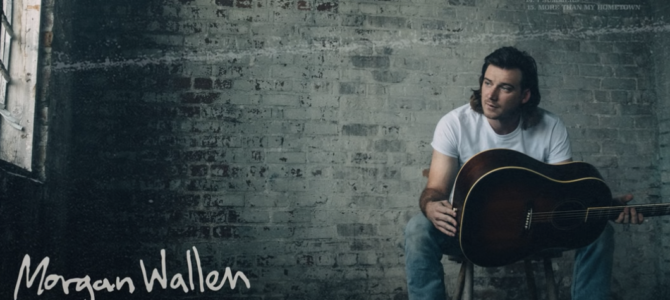
Country artist Morgan Wallen was suspended indefinitely by his record label due to TMZ recording him using the N-word in a story that circulated on Feb. 2. It happened just as many tracks from Wallen’s “Dangerous: The Double Album” released on Jan. 8 were just making their way to radio.
Now, Wallen’s outburst is beginning to rehash a critical discussion about whether consumers can separate the art from the artist.
The General Album Theme
Wallen’s 30-track double album is contemplative and purposefully downbeat. In it, he navigates fame. When the album debuted, it hit number one on the U.S. Billboard 200 and stayed there for the past three weeks.
In fact, “Dangerous” set the record for the biggest first day and the biggest first week for a country album all-time on Apple Music, as well as the most “pre-added” country album in history on the platform. On Spotify, it reached the biggest first-day all-time stream record for a country album. Of course, mainstream radio will not be an option now for Wallen because all stations have rescinded their licensing agreements.
There are sort of typical “made for radio” songs, like “Beer Don’t,” “Need A Boat,” and “Somethin’ Country,” that are energetic and drinking-song worthy, but the album is overwhelmingly produced for those favoring slow, nostalgic, and often sad songs with strong lyricism and storytelling.
Included in the album are previously released songs “This Bar,” “More Than My Hometown,” “7 Summers,” and “Heartless.” These songs particularly harp on Wallen’s longing for essentially simpler times, often mentioning the same girl across songs whom he did not end up remaining with from his hometown. Wallen made a short film for “7 Summers” released in Nov. that depicted his life story of getting injured playing baseball and moving on in life.
This general theme and tone are prevalent, particularly in what I think to be the most well-rounded overall song on the album, “Sand in My Boots.” The song features a light piano that is favorable over the sort of trendy Nashville drum-beat infusions that are inevitable in many mainstream and marketable country songs nowadays. The lyrics also come through a lot clearer in “Sand in My Boots,” which is especially effective in its central focus and sorrowful wisp not reliant on the ever-important modern beat drop.
He sings in the chorus:
Yeah, but now I’m dodging potholes
In my sunburnt Silverado
Like a heart broke desperado
Headed right back to my roots
Something ’bout the way she kissed me
Tells me she’d love eastern Tennessee
Yeah, but all I brought back with me
Was some sand in my boots.
There are similar nostalgic and homesick longings in “865,” which is named after an old girlfriend’s phone number. In accordance with virtually all other songs on the double-album—Wallen describes drinking to ease the pain of fame, as well as his prior memories of his past life with women.
If Wallen focused more on these sorts of collected and down-to-earth ballads, it would raise the value of the work significantly. Instead, whether it be his fault or that of his (former) Nashville recording colleagues, “Dangerous” falls into the trap of having snappy, insincere songs better suited for an overly produced Luke Bryan record.
The Rationale for His Advertised Despair
The most interesting part about Wallen’s new album is that the exact sentiments he expresses pertaining to his struggles with fame and alcoholism came full circle when he made the awful mistake of saying a racial slur which may end his career. As of Feb. 4, iHeartRadio, Cumulus Media, Apple Music, Spotify, and others removed Wallen’s music and photographs from their platforms.
In May 2020, Wallen was notably charged for a drunk and disorderly outburst in Nashville, after being kicked out of Kid Rock’s bar. Wallen also faced scrutiny when a video surfaced in October a week before performing on “Saturday Night Live” that showed him kissing college girls at a crowded party. This violated a clause in his contract with SNL concerning COVID-19 protocols and sheltering-in-place.
The “Dangerous” album looks back on many of his mistakes from his past, but also depicts his battle with inner demons that were not as represented on his less-sophisticated 2018 freshman album, “If I Know Me.” In fact, the double-album is a 365-degree transformation from the 2018 release.
While critically acclaimed and featuring agreeable songs like “Whiskey Glasses,” “If I Know Me” is a bit surface-level and does not tell us a whole lot about who he actually is. For the better, “Dangerous” does this effectively—portraying the artist as more accessible and sincere to fans, putting his problematic character on full display.
The song “Livin’ the Dream” approaches some of the foremost issues in his life. In the opening verse, he says:
Mama don’t pray for my success anymore, yeah
But mama still prays for me
Seein’ the world ain’t really seein’ the world
Through a window from A to B
Between alcohol and women and Adderall and adrenaline
I don’t ever get no rest
Sign my life away to be the life of the party
Yeah, to everybody else.
It is a grouping of lyrics that many would argue is more fitting for the ailing pop artist who effectively “sells his soul” for Los Angeles and New York City lifestyles, and not really representative of the typical country music-esque good ol’ boy tranquility and disregard for the sort of drug-addled fame culture.
The powerful line “Mama don’t pray for my success anymore, yeah, But mama still prays for me” relates to his upbringing. Wallen grew up in a strong Christian family and his father is a pastor. He clearly fits a different mold now and discusses this, not wanting to “be the life of the party” although he has clearly established himself as that through his questionable stunts.
In the second verse, he is a bit more explicit in his insecurity:
Drinkin’ ’cause I need to, damn it, what a good life
Judgin’ by my long hair, you might think I don’t care
Sittin’ here, sippin’ and bitchin’ about a spot where
People would kill to be, kill to be, kill to be
But y’all, it ain’t as good as it seems, this livin’ a dream is
Killin’ me, killin’ me, killin’ me
It’s killin’ me, killin’ me, killin’ me.
“Livin’ The Dream” is a song in which Wallen ironizes the life of celebrity, communicating that it is worse than being just a regular person. It’s a message that almost makes you pleased you are not in the limelight each and every day like he is—or was prior to Feb. 3.
Where It Shines Best, Versus Sinks
The first 15 songs of “Dangerous” encompass the strongest of Wallen’s melodic and heartfelt vocals. “Neon Eyes” has not been talked about by critics a whole lot, but it brings back twangy 70s country-disco vibes that are sort of reminiscent of Midland’s 2017 album “On the Rocks,” and partly their 2019 album “Let it Roll.” It is not as slow as the other songs on the album, but equally touches on themes of loneliness and despair.
“Wonderin’ Bout The Wind” is a good song that shifts in a way that works well, differentiating between rising and falling vocals. Similar to “Neon Eyes,” it has all undertones of the general thematic basis of the album, but has an energy and veracity to it. The vocals are a bit overproduced on this song, certainly, which makes it mechanical (especially in the chorus).
“More Than My Hometown,” which was initially released on May 27, 2020, catchily captures the nostalgia Wallen promulgates via intricate storytelling. His vocals likewise shine on this, as he reminisces on what “could have been” with a high school sweetheart. Wallen sings about being unable to love a girl “more than [his] hometown,” preferring to stick to his old ways and what he knows.
The back half of the record is not as meaningful as the first. “Silverado For Sale” is one of the few exceptions to this, although its approach is better relayed in the thematically similar “Sand in My Boots.”
“Whatcha Think Of Country Now” does not really jive with the other collection of material on the album, and might have been better suited for release as a single or by another artist. It resembles the bizarre narrativizing in Blake Shelton’s forgettable “Hell Right” featuring Trace Adkins in August 2019.
“When I met you I was chillin’ to some old Willie / Bet you were thinkin’, “How’d I get up with this hillbilly?’ Saw yourself sittin’ pretty in the big city,” Wallen sings—trying to rhyme, but sounding odd and corny.
“Wasted on You” has gotten a lot of attention in the press, and would probably be one up for contention for awards absent Wallen’s slur. It is a slower song, like “Neon Eyes,” that changes pitch in the chorus. It’s alright, but also just not as lyrically interesting.
The song “Dangerous” is too-pop-infused for me, overproduced like many others nowadays, with just a lot of different sounds all hitting at once. The lyrics do not reveal much of anything and are not on-par with others on the album.
“Only Thing That’s Gone,” featuring Chris Stapleton, was probably supposed to be a bigger hit than it ended up. Stapelton can reach vocal points that no other artist in country can, with the unique ability to hold the same pitch for several seconds. The song is not one of my favorites and feels aesthetically repetitive on a verse-to-verse basis. It’s much better than the weak pop stuff, though.
One last song to mention is “Quittin’ Time.” This is the final listing, and it’s really strong and synonymous with the thoughtful melody in “Sand in My Boots,” and “Wonderin’ Bout the Wind.” It contains vividness through articulate lyrics and imagery about packing a suitcase and leaving but conflicted about doing so.
Wallen’s double album features several melancholy songs that offer insight into his seemingly lonely life through moving and twangy, knockout vocals accompanied by piano. It definitely feels like there is fluff on “Dangerous,” which shows that just making the largest record possible does not mean it is somehow better.
A more intimate, 10 to 15 song album seems like the sweet spot. More than half of the record is beautifully produced and contemplative, while some fall into Nashville drum-beat clichés and extensive vocal production that sounds mechanical, demonstrative of what often sells in today’s continually pop-infused country genre.
Amid swirling controversy, it remains to be seen whether the 27-year-old recording artist will ever recover. For now, as country music critic Grady Smith rightly puts it, “[Morgan’s] going to go away for a while,” headed for much-needed personal reflection about a whole lot of things if he is prudent.








